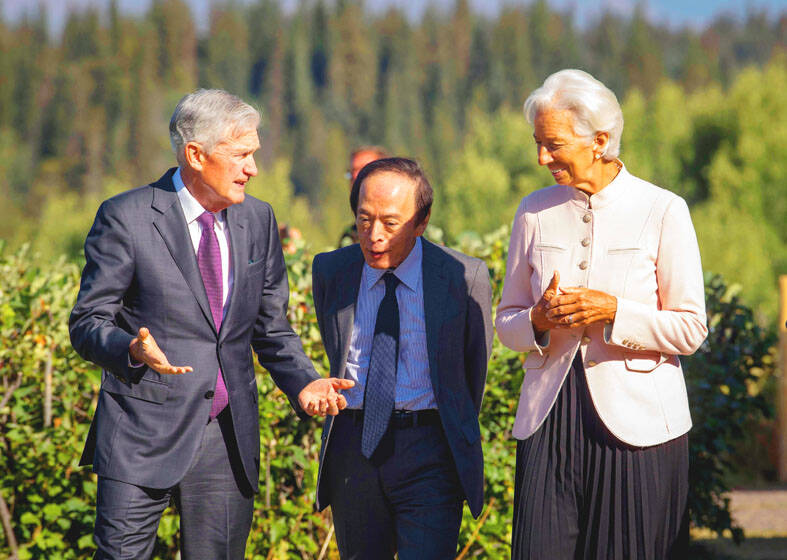A jump in the share of foreign-born workers after the COVID-19 pandemic helped Europe bring inflation down without sharply slower growth, European Central Bank (ECB) President Christine Lagarde said on Saturday.
A key factor “has been the rise in both the number and participation rate of foreign workers,” Lagarde said in a speech in Jackson Hole, Wyoming, at a US Federal Reserve economic symposium. “In Germany, for example, GDP would be around 6 percent lower than in 2019 without the contribution of foreign workers.”
Spain’s strong post-COVID-19 pandemic economic growth “also owes much to the contribution of foreign labor,” she said.

Photo: AP
Lagarde’s remarks echoed a common view among economists that an influx of foreign workers helped companies expand their output and meet a spike in demand after the pandemic that followed stimulus benefits.
The increased supply helped bring down inflation in Europe and the US. Yet the rise in immigration also sparked a political backlash in both economies.
“Migration could, in principle, play a crucial role in easing” labor shortages as native populations age, Lagarde said, but “political economy pressures may increasingly limit inflows.”
Lagarde also said that a drop in inflation-adjusted wages, greater hoarding of workers by companies, and an influx of elderly people into the labor force also contributed to steady economic growth even as the ECB lifted interest rates.
Historically, higher borrowing costs have dragged down economic growth, often causing recessions and leading to higher unemployment. Yet that did not happen as the ECB raised its key rate in 2022 and 2023, she said.
While foreign-born workers accounted for just 9 percent of the EU’s labor force in 2022, they have made up half of the bloc’s labor force growth in the past three years, Lagarde said.
More elderly people also joined the workforce, Lagarde said. Without that increase, the unemployment rate in the 20 countries that use the euro would be elevated — 6.6 percent, rather than the current rate of 6.3 percent, she said.
Bank of Japan Governor Kazuo Ueda spoke on the same panel at Jackson Hole and cited a similar trend in Japan since the pandemic.
While the foreign-born make up just 3 percent of the workforce, they have made up half of recent workforce growth, he said.
Japan’s population dropped for a 14th straight year last year, Japanese Ministry of Internal Affairs and Communications data showed. Japan also has one of the oldest populations in the world, with almost 30 percent of residents aged 65 or older.

NEW IDENTITY: Known for its software, India has expanded into hardware, with its semiconductor industry growing from US$38bn in 2023 to US$45bn to US$50bn India on Saturday inaugurated its first semiconductor assembly and test facility, a milestone in the government’s push to reduce dependence on foreign chipmakers and stake a claim in a sector dominated by China. Indian Prime Minister Narendra Modi opened US firm Micron Technology Inc’s semiconductor assembly, test and packaging unit in his home state of Gujarat, hailing the “dawn of a new era” for India’s technology ambitions. “When young Indians look back in the future, they will see this decade as the turning point in our tech future,” Modi told the event, which was broadcast on his YouTube channel. The plant would convert

‘SEISMIC SHIFT’: The researcher forecast there would be about 1.1 billion mobile shipments this year, down from 1.26 billion the prior year and erasing years of gains The global smartphone market is expected to contract 12.9 percent this year due to the unprecedented memorychip shortage, marking “a crisis like no other,” researcher International Data Corp (IDC) said. The new forecast, a dramatic revision down from earlier estimates, gives the latest accounting of the ongoing memory crunch that is affecting every corner of the electronics industry. The demand for advanced memory to power artificial intelligence (AI) tasks has drained global supply until well into next year and jeopardizes the business model of many smartphone makers. IDC forecast about 1.1 billion mobile shipments this year, down from 1.26 billion the prior

People stand in a Pokemon store in Tokyo on Thursday. One of the world highest-grossing franchises is celebrated its 30th anniversary yesterday.

Zimbabwe’s ban on raw lithium exports is forcing Chinese miners to rethink their strategy, speeding up plans to process the metal locally instead of shipping it to China’s vast rechargeable battery industry. The country is Africa’s largest lithium producer and has one of the world’s largest reserves, according to the US Geological Survey (USGS). Zimbabwe already banned the export of lithium ore in 2022 and last year announced it would halt exports of lithium concentrates from January next year. However, on Wednesday it imposed the ban with immediate effect, leaving unclear what the lithium mining sector would do in the